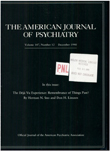Lies and liars: psychiatric aspects of prevarication
Abstract
The authors discuss the phenomenon of lying, a common psychic process that has received remarkably little scrutiny. The ubiquity of lying and others forms of deception suggests that they have "normal" aspects, but lying which is persistent or destructive to the quality of a person's life becomes pathological. Lying has many determinants, including developmental, biological, social, and psychodynamic. Antisocial, histrionic, narcissistic, borderline, and compulsive personalities have been associated with lying. The treatment of lying needs to be individualized according to the overall symptom complex in which it is embedded.
Access content
To read the fulltext, please use one of the options below to sign in or purchase access.- Personal login
- Institutional Login
- Sign in via OpenAthens
- Register for access
-
Please login/register if you wish to pair your device and check access availability.
Not a subscriber?
PsychiatryOnline subscription options offer access to the DSM-5 library, books, journals, CME, and patient resources. This all-in-one virtual library provides psychiatrists and mental health professionals with key resources for diagnosis, treatment, research, and professional development.
Need more help? PsychiatryOnline Customer Service may be reached by emailing [email protected] or by calling 800-368-5777 (in the U.S.) or 703-907-7322 (outside the U.S.).



